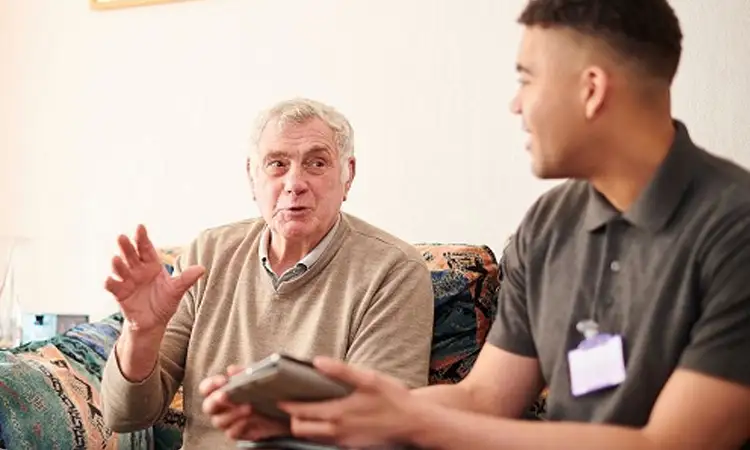Keeping Safe
You may feel unable to leave your relationship and that’s ok. The first step towards being safe is to tell someone you trust. That may be a friend, a colleague, a family member or us.
We are here to support you and create a safety plan together that works for you. When you’re ready, please get in touch.
In the meantime, here is some advice on how you might be able to reduce the risk from your current/ex-partner or family member and prepare for leaving an abusive situation.

Making a safety plan
Having a plan can help you to feel that it is possible to leave. We know it’s hard and there is also an increased risk of harm from your abuser if they suspect you are making plans.
These steps can help you to feel safer, and move towards taking action, at a time that is right for you.
-
- Tell someone you trust what is going on – a friend, colleague or trusted family member
- In an emergency, call 999 – if you can’t speak, cough or tap the handset – the police will know it’s an emergency – and teach your children how to call 999 and how to ask for help
- Arrange a safe place to go in case you need to leave suddenly
- Consider purchasing a pay-as-you-go phone and hiding it in case you need it in an emergency
- Make several copies of important papers such as financial, insurance, and benefits papers. Give a copy to a trusted person or leave them at work
- Gather proof of your identity – driving license, passport, birth certificates
- Make extra sets of important keys and hide them to use in an emergency – leave a spare set of car keys with a trusted person.
- Prepare a bag of essentials for yourself and your children (clothing, medicine, important documents, spare set of keys) and leave it with a trusted person in case you need to leave quickly.
- Carry emergency money on you so that you can use public transport / payphone immediately in an emergency.
- Memorise important emergency and support helpline numbers.
- Develop a code word to use with a trusted person in case of emergency e.g. texting ‘Milk’ could mean ‘Call 999 I’m in danger’
- Practice how you would leave home safely in an emergency
- Share your safety plan with a trusted person- you can even get them to help you

Preparing to leave
When the time comes, the point of leaving can be scary and pose a higher risk to your safety. Taking these actions can help you to stay calm and safe.
- Tell someone you trust about your plan.
- Plan to leave the house when your partner is out, ideally for some time.
- Take your children with you and consider informing someone at their school of the situation.
- Gather essential items to take with you, including documentation for yourself and your children.
- Change the privacy settings and location service on your phone or consider changing your number/using another phone.
Keeping safe online
Cover your tracks online
Minimise the chance of someone knowing you have visited this website.
- Use the ‘Exit Site’ button in the top right corner of this website to quickly hide the page – it will direct you to the Google homepage. You will still need to delete your browsing history fully to cover your tracks
- Use the internet somewhere other than at home; at a local library, a friend’s house, or at work, if possible.
- Use a password on your computer and phone, and don’t disclose it to anyone.
- Use “Private Browsing” or “Incognito” windows to view information online that you do not wish to have stored on your internet history (online services can still see your history but it won’t leave traces of your activity on your computer – history, web cache)
Internet Explorer: Click the Safety button — select Tools — select ‘InPrivate Browsing’
Firefox: Click the Menu button with three horizontal lines — select ‘New Private Window’
Microsoft Edge: Click the three dots in the top right of the page — select ‘New InPrivate window’
Chrome: Click the Menu button with three horizontal lines — select ‘New Incognito Window’
Safari: Click the File button — select ‘New Private Window’ - Delete your browsing history – go to the ‘history’ section of your browsing page, find any entries that say www.oasisdaservice.org.uk, right-click on this and choose Delete.
- Install free antispy software for your computer: Windows | Apple
- Always log out
- Remove mobile spyware from your phone and disable geolocation tracking and geotagging (and on any social media platforms you use)
Computer safety
- Use a safe computer until yours has anti-spyware installed.
- Create new obscure, encrypted passwords and password-protect your computer.
- If it is not possible to remove spyware without your abuser noticing, do not use it to access support sites.
Mobile phone safety
- Set your mobile so that you have a PIN to unlock it
- Don’t use apps that use your location, ask for administrator access or request using your GPS location. Delete any that are suspicious.
- Use another mobile to make calls or if you are visiting a sensitive location.
- Turn off geolocation and geotagging in mobile settings, camera and camera apps.
- Turn off Frequent Locations tracking.
- Reset your phone to the factory settings to delete any spyware.
- If you are fleeing an abusive situation, you should take the battery out until you are safe and do a factory reset.
- Ask your family and friends not to give out your number. They can take a message and you can call back.
Email Safety
- Set up a new anonymous email address (i.e. don’t use your name).
- Create multiple email accounts, if one becomes compromised you will still have access to the others.
- Permanently delete an email by right-clicking it in the deleted items folder (Outlook, Gmail, Hotmail, Yahoo etc)
- If you are receiving threatening or harassing emails, save them, make a copy and print them for evidence against the sender.
Social Media and Instant Messaging Safety
- Delete your account and set up a new one with a different name and obscure photo. Set your account to ‘private’ where possible. Only invite and follow trusted people. Do not set up relationships in the account.
- Set your account with the highest privacy settings, including turning geotagging to off/disabled and check your settings regularly.
- Control who can comment on your posts – remember that a friend of a friend can see comments they make. Make sure you do this for all your social media accounts, Whatsapp etc.
- Ensure all of your friends’ settings are set to “friends only”
- Check to see if your photos are geotagged – go into your photo app, swip up and see if a location has been added, remove the tags if necessary.
- Block your abuser and any mutual friends that you may have – you can also pre-empt other accounts they may have and block those too.
- In direct messages, use the filter functions to automatically ignore, remove and block messages
- Educate your children about the risks associated with social media
- Do not open any pop-ups that you were not expecting, these could contain spyware
Revenge porn and intimate image sharing
It is illegal to share or threaten to share revealing or intimate videos or pictures of someone without their consent.
Get help: Revenge Porn free helpline 0345 6000 459 (Tuesday – Thursday 10 – 4pm) www.revengepornhelpline.org.uk.
If you’re under 18 and a nude image or video of you has been shared online, you can report it to be removed from the internet. Call Childline 0800 1111 or visit the Childline website.
Stay Safe Hollieguard app
Hollieguard is a free app that turns your smartphone into an advanced personal safety device. Alert your chosen person/people to distress and monitor travel, by shaking your phone to generate an alert, and information about your location. All data is stored on secure servers, not your phone.
Use Refuge’s how to break up digitally resource to find more information and advice.
You are not alone
By sharing what’s going on with someone you trust, and reaching out to us, you can make the first steps to the safe life you deserve. Please do not suffer alone. Our team is here to talk through your situation and support you in making a safety plan and reducing your risk.
Call our helpline
0800 917 9948
Monday, Tuesday, Wednesday 09:30–11:30am, 12:30–2:30pm
Thursday and Friday 09:30–11:30am
(except bank holidays)
Calls are free and will not show up on itemised phone bills

Related content
The answers to frequently asked questions and misconceptions about domestic abuse.




